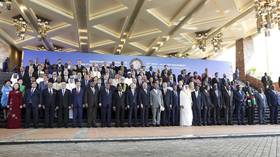Uganda disowns ICJ judge over vote in Israel genocide trial
Justice Sebutinde argued that the case against Israel was political not legal, and that ‘genocidal intent’ was unproven
Uganda’s government has distanced itself from Judge Julia Sebutinde, Kampala’s representative in the International Court of Justice (ICJ), after she opposed all emergency measures sought by South Africa in the genocide case against Israel.
On Friday, the ICJ ordered Israel to take “all measures within its power” to prevent acts that could qualify as genocide against Palestinians in Gaza, but stopped short of calling for a full ceasefire. Out of nine provisional measures requested by South Africa, six were approved by the overwhelming majority of 17 judges on the panel, including an Israeli judge who voted in favor of two. However, Judge Julia Sebutinde, who is currently serving her second term in the international court, voted against all of them.
“Justice Sebutinde’s ruling at the International Court of Justice does not represent the Government of Uganda’s position on the situation in Palestine,” Adonia Ayebare, Uganda’s Permanent Representative to the UN, said on X (formerly Twitter) on Saturday.
The message was echoed by Uganda’s Foreign Ministry, which released a statement saying: “the Government categorically clarifies that the position taken by Judge Sebutinde is her own individual and independent opinion, and does not in any way reflect the position of the Government of the Republic of Uganda.”
The ministry affirmed the Ugandan government’s position of condemning “the continuing Israeli military campaign against defenseless Palestinian people,” calling for “an immediate end of Israeli military aggression and siege of Gaza Strip” as well as “rejecting any individual or mass forcible transfers and deportations of Palestinians from the Occupied Palestinian Territories.”
Sebutinde defended her “dissenting opinion” in the Palestinian case, arguing that South Africa has failed to demonstrate that the acts allegedly committed by Israel were done “with the necessary genocidal intent, and that as a result, they are capable of falling within the scope of the Genocide Convention.” She added that the core of the issue was fundamentally political, not legal.
Uganda’s Judge Julia Sebutinde, 69 is the first African woman to sit on the ICJ panel. According to the Institute for African Women in Law, she comes from a modest background and was born when Uganda was actively fighting to break away from British colonial rule.
She received her bachelor of law degree from Makerere University in 1977 and later pursued her education in Scotland, where she earned a master of law degree from the University of Edinburgh. In 2009 she was awarded a doctorate from the same university. Prior to being elected to the ICJ, Sebutinde served as a judge of the Special Court for Sierra Leone, during which period she presided in the trial of former Liberian President Charles Taylor for war crimes committed in Sierra Leone. Taylor was found guilty on 11 accounts and was subsequently sentenced to 50 years in prison.
You can share this story on social media:








Comments are closed.